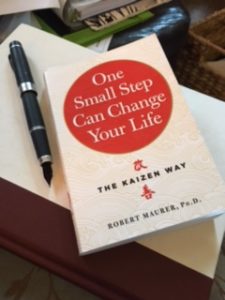17 Ways to Break Back into Your Writing Project
 For most of this year, and obsessively this summer since coming home from France, I’ve been working on my mystery novel. But summers have not, historically, been my best time for getting work done.
For most of this year, and obsessively this summer since coming home from France, I’ve been working on my mystery novel. But summers have not, historically, been my best time for getting work done.
Summers are usually my time for letting work lie fallow. Summers are for hanging out with my kids. Summers are for family trips and family reunions. Summers are for swimming in really cold water. Summers are for campfires and marshmallows flaming at the end of pointy sticks.
Then, every year, inevitably, summer begins to draw to an end. Lately a few of my friends have remarked on their sense of fall already in the air, but this morning was the first morning I really noticed it for myself. It wasn’t raining this morning, the sky was blue. But there was a nip in the air. I turned on the heater in my cabin (just for a minute!) before I settled down to write. On my forest walk, I picked up a scarlet leaf.
This year is also, I remarked to my husband, the first late summer of many (since 1998!) that we have not been sending one of our own children off to school. No new paper or pens, no new backbacks, no pleading (from already fully kitted-out daughters) for “new school clothes.”
Maybe you’re the sort of person who greedily jumps straight back into a writing project, without hesitation. But if you, like me, have some difficulty re-entering a project (for me, it’s more like having to carve my own battering ram and then break down the door), here are 17 suggestions:
- Remember how you felt as a little kid, getting new school supplies? Remember how eager you were to use them? Take yourself school shopping and buy a new notebook and pen. Don’t do anything with them the first day! (Remember your mother telling you that you couldn’t use them until school started? Remember how eager that made you–or am I just weird?)
- The first day back–don’t “write,” just list details, images, or issues that you want to include in your writing project. (List 20 or more!)
- Write a list in which each line begins with I could write about ….
- Try listing what you will definitely NOT write about.
- Tell yourself that you’re NOT going back to your writing project, that this is just an experiment. Just play.
- Put a foil star or draw a fat red star or some other symbol on
 your calendar for every day you work. Hang this up where you can see it from your writing desk. Think of putting the star up as a reward for having written.
your calendar for every day you work. Hang this up where you can see it from your writing desk. Think of putting the star up as a reward for having written. - Speaking of “play,” think of a beginning pianist practicing scales or simple songs (interesting that we “play” music, but don’t think of writing, usually, as play). Try writing out someone else’s poem or paragraph, just for practice. “Play” on the page.
- Draw a picture or a map of what you want to write.
- Set a timer–timers make great, non-judgmental bosses. At least for me, when I set a timer, I seem to click “off” that part of my brain that throws up a lot of resistance.
- Keep the timed writings short–no more than 15 minutes, but as little as 5 (or even ONE) if you’re having a lot of difficulty.
- Robert Maurer in One Small Step suggests simply holding the journal on your lap for a minute. I haven’t had to resort to this, but I think it would work in extreme cases. Just hold your notebook or your laptop for a while, as if holding yourself or whatever that small part of yourself is that is having difficulty getting started. Don’t deny it.
- Write an email to someone very very good at encouraging you. In this email, describe your project. (You don’t have to send the email.)
- Imagine writing the whole thing in one line per day, for instance on Twitter.
- Skip the opening line. Go straight to the second, or even later. (You can write the first line later.)
- Write an acknowledgments page. Thank all the people who will help you with this project, all the people who are waiting eagerly for it.
- Write something–even if only a few lines, or for a few minutes–every day, even weekends or holidays, for 3 days straight. Or 40 days. (Don’t forget your star!)
- Write the dedication to appear at the beginning of your writing project. This is for my mother, who read all of Agatha Christie, at least twice.
I’d love to read it!






Your exercises to generate ideas and get the creativity flowing were some of my favorite things in your Creative NonFiction and Creative Fiction classes. I’m glad you’re still writing. You inspire me to experiment with words again.
Thank you for sharing this.
Kaylena — so lovely to hear YOU are still writing. Yes, yes, keep going!